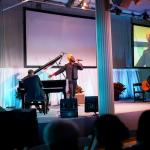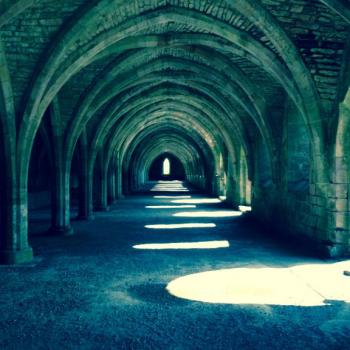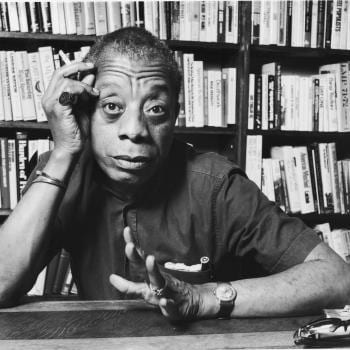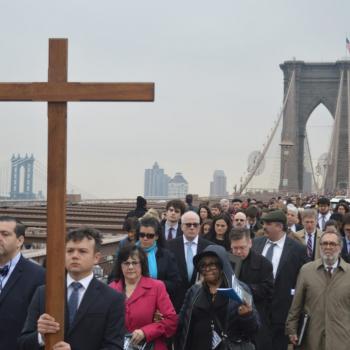By Guest Contributor, Elena Neuzil
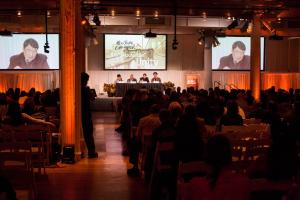
The New York Encounter is an annual three-day public cultural event in the heart of New York City. Run by members of the lay movement Communion and Liberation, the Encounter strives to witness to the new life and knowledge generated by the faith, following Pope Benedict’s claim that “the intelligence of faith has to become the intelligence of reality.” This year’s theme, “An ‘Impossible’ Unity”, proposed that “[t]he full scope of our humanity, with all its vast and profound needs and desires, may suddenly emerge, elicited by memories, thoughts or events, but usually quickly fades, without lasting joy or real change. And unless our relationships are rooted in the common experience of such humanity, we don’t even have real dialogue; we just chat, gossip, text or argue.”
Cracks in Postmodernity welcomes guest contributor, Elena Neuzil, who wrote this article about Saturday evening’s presentation, “Out of Many, One: Really?”, which featured Amitai Etzioni and Mark Lilla.
NEW YORK CITY — Neither you nor I invented this society. We didn’t write the Constitution, develop Western philosophy, or invent the English language or the alphabet it’s written in. We didn’t set up the societal structures we participate in today. Instead, we built today’s society on yesteryear’s. We tinkered with old ideas and pruned away shriveled ones. We fought about them — and we continue to do so. But we are in an especially divided time in our national politics, and it was this issue that professors Amitai Etzioni and Mark Lilla discussed in “Out of Many, One: Really?”, on Saturday evening at the 2018 New York Encounter. Etzioni, a professor of international relations at The George Washington University and a leading American intellectual, and Lilla, a humanities professor at Columbia University and a frequent The New York Times contributor, are exceedingly qualified to analyze the state of our society. Unfortunately, they both come to similar negative conclusions about our current public life.
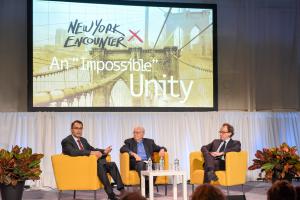
Society is a communal effort and one that spans across history. When we build or tear down our society, we are adding to or striking down not only what we’ve developed but also what our ancestors have done. We do not act in a vacuum, neither as individuals without public lives nor as individuals relating only to one historic era. We come out of a human conversation that stems from the origins of our species and affect and respond to that conversation in our own time.
Everything we do is an action and reaction to this global community. And if we have any care at all for this community and how to improve it, our actions should center around a question Etzioni articulated: “Under what conditions are we better than we would be otherwise?” His answer to that, and Lilla’s, is in community.
Communities provide informal social controls to make us better. Communities make us healthier, increase our lifespans and infuse our lives with meaning, Etzioni said. But what if we don’t get along, refuse to consider certain people part of our community or never speak with people who disagree? Are we supposed to force ourselves through conversation with them merely to increase our own lifespans?
No. We are to talk with those who we consider bigoted, racist, ignorant or simply wrong because we all exist in this society together. Whatever happens to the country, to the world, happens to all of us.
“We are going to share a destiny, whether we like it or not,” Lilla said. We did not create this society, and unless we are very unlucky or very stupid, we will not be the last ones to add to it. We should consider ourselves as contributors to the human story, which began before and will continue after our own time.
It doesn’t matter that we don’t agree on everything. That moment will never arrive. There is no ideal civilization or culture waiting in the wings for us, ready to be deployed the moment we need it most. That kind of culture will not spring up without any of us noticing. We need to build it. It takes work, and that means working with whoever and whatever we’ve got. As Lilla put it, “You go into politics, you go into history, with the people you have, not the people you wish for.”
We do not and will not have perfectly aligned goals. But we are all human, and we do have at least some common goals and can recognize each other’s common humanity. As Etzioni said, to lead a good life, we must devote part of ourselves to others. And that means investing in community. None of us has a monopoly on meaning or truth. We can only search for the answers with each other.
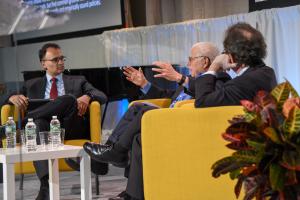
This will mean compromise. This will mean putting aside differences to work toward higher ends, Lilla said. We have no other option. As the theme of this year’s Encounter suggests, unity is not unrealistic or impossible. Rather, it is our only hope. It is only unified as a global community that we can solve global problems, and that sort of unity is begun by making a single human connection – and another, and another. When communities wither, civilizations fall. During the short time that it’s our turn to add to the human story, will we create a civilization of unity? Of community, dialogue, dignity, respect? We will decide, and face the consequences, together.
photos from: https://www.flickr.com/photos/newyorkencounter/albums/72157690601035741


